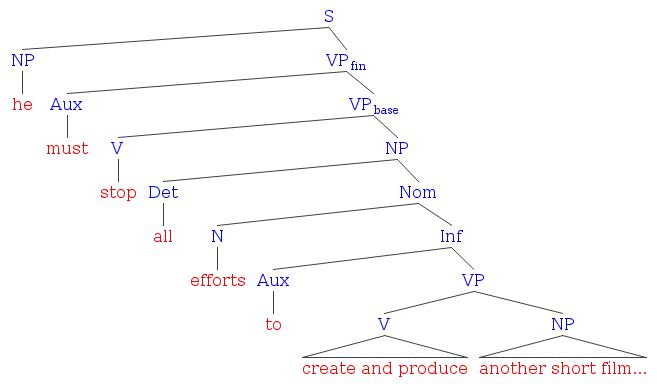Stop Creating!
Posted by Neal on January 13, 2014
You know, I really liked the first film I saw Shia LaBeouf in, and the second one wasn’t too bad. I was always a bit bugged by the clear misspelling of his last name, which I knew from high school French II should have been LaBoeuf, but I wouldn’t let a petty thing like that cause me to boycott a movie. But I’ve been increasingly incredulous of the unfolding story about LaBeouf and a graphic novelist named Daniel Clowes, and I’m inclined to boycott LaBeouf now. Here’s the recap for those who haven’t been following it:
- LaBeouf produced a movie titled Howard Cantour.com.
- Daniel Clowes observed that large portions of the dialogue were plagiarized from his book Justin B. Damiano.
- LaBeouf apologized on Twitter.
- LaBeouf apologized numerous other times on Twitter, plagiarizing other notable apologies.
- LaBeouf apologized via a message in skywriting over LA.
- LaBeouf then tweeted a storyboard, supposedly for his next movie project, which clearly plagiarized from another of Daniel Clowes’s works.
- Clowes’s lawyer sent LaBeouf a cease-and-desist letter demanding that “he must stop all efforts to create and produce another short film that misappropriates Mr. Clowes’ work….”
You can read more about this here, here, and here, but here’s where the story takes a linguistic turn, so this is our stop.
Ben Zimmer emailed me to tell me about how LaBeouf was deliberately misreading the cease-and-desist letter. He sent along a few links that I’ll share. First, here’s an image of the original letter, along with LaBeouf’s edited version:
https://twitter.com/JRMcGrail/status/422097308403384321
And here’s another message he delivered via skywriting:
#stopcreating pic.twitter.com/G1F3G9EITH
— Shia LaBeouf (@thecampaignbook) January 10, 2014
In addition to copping out with the bullshit claim that all authorship is plagiarism, LaBeouf’s carryings-on exemplify two argument techniques that really get under my skin. One is the deliberate cutoff, exemplified in the classic dialogue:
A: Why did you do this?
B: Well, I didn’t think I–
A: That’s right! You didn’t think!
The other is the straw-man technique, which I often get from my sons. Take a demand from your opponent, amp it up to its most extreme, idiotic version, then belittle your opponent for being so naive as to make such an extreme, idiotic demand. In this case, “stop creating a particular kind of thing” becomes “stop creating (anything)”.
Thinking about the syntax of the butchered sentence, though, I wonder if LaBeouf has realized that he can carry his half-ass mis-parsing even further, to arrive at a completely grammatical parse that’s even more to his liking. Here’s the structure of the intended parse:
The and is joining the smallest constituents it can join: the verbs create and produce. The shared direct object is another short film that misappropriates the word of Daniel Clowes. But LaBeouf wants to break the connection between create and produce, and have create its own verb phrase, meaning “engage in any kind of creation.” Well, in that case, what do we do with the and? Instead of hooking up the two single verbs, it will have to hook up the next larger constituents: the verb phrases stop all efforts to create and produce another short film…. So the parse would be like this:
So if he wanted to, LaBeouf could argue that this letter actually requires him to produce another short film that misappropriates the work of Daniel Clowes. Syntactically, it’s impeccable. Semantically, there’s the problem that the verb produce in the movie-making sense entails creating, so he couldn’t satisfy both requirements. Pragmatically, there’s the oddity of requiring that someone do something that involves lawbreaking (i.e. misappropriation). But hey, it’s about as logical as what he’s been doing already, so what the heck?
This entry was posted on January 13, 2014 at 12:10 am and is filed under Attachment ambiguity, Coordination, Movies, Pragmatics. You can follow any responses to this entry through the RSS 2.0 feed. You can leave a response, or trackback from your own site.
5 Responses to “Stop Creating!”
Leave a comment Cancel reply
This site uses Akismet to reduce spam. Learn how your comment data is processed.


dainichi said
I’m not a native speaker, but I seem to notice an ambiguity in “… efforts to create … film that misappropriates …”. I mean, surely Shia didn’t have as an explicit goal to misappropriate Daniel Clowes.
I believe “effort” in English is ambiguous between a meaning close to “attempt” and a meaning close to “work”. Surely the second meaning is intended here: “stop working on stuff which misappropriates DC”. But if you read it as “stop attempting to misappropriate DC”, you might counter that “I never attempted such a thing, but if I did it unintentionally, is it OK?”
Neal said
The kind of ambiguity you’re talking about is known as a de dicto/de re ambiguity. It happens with so-called intensional verbs: verbs whose meaning requires you to imagine other possible worlds. In the post I linked to, the verb was want; in this one, it’s efforts (which I guess is a noun, but with the same meaning as the verb try).
dainichi said
Ah yes, thanks for reminding me of the de dicto/de re distinction. But I think the noun “effort” introduces another interesting ambiguity here, i.e. one between the intensional and non-intensional meaning. E.g. “Thanks for your efforts” usually means “Thanks for your hard work”, but could be read as “Thanks for trying”, which implies lack of success. And as you say, if you choose the intensional reading for the original example, you get the de dicto/de re ambiguity next.
Neal said
Ah, I see. Yes, I think the “doing it by accident” would be a grammatically defensible defense, and one that’s willfully obtuse enough to be of a piece with the rest of LaBeouf’s actions.
EP said
Absolutely unbelievable. However he stops is fine, provided he stops now.